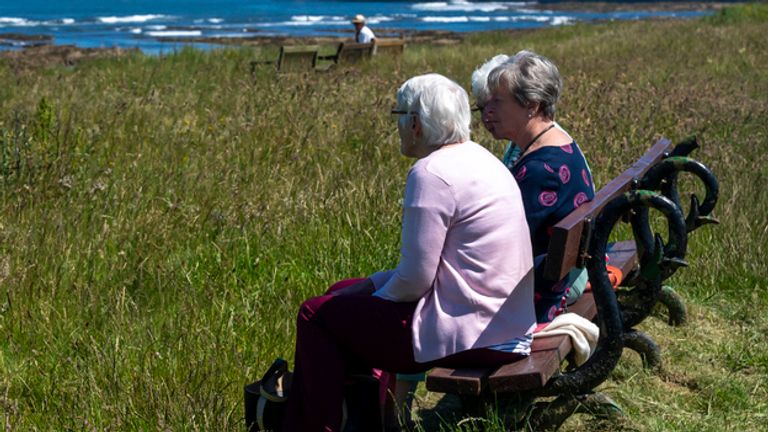Women's life expectancy falls in England's poorest areas while the North-South health gap grows
The overall rate at which life expectancy in England increases has slowed dramatically since 2010.
Tuesday 25 February 2020 10:43, UK
The life expectancy of women has fallen in the most deprived areas of England, according to a new report.
The study by Professor Sir Michael Marmot comes 10 years after his first analysis of data tracking the health gap between rich and poor.
The new report, Health Equity In England: The Marmot Review 10 Years On, found that the life expectancy of women in the most deprived areas fell by 0.3 years between 2010-12 to 2016-18 while those in the richest increased by around 0.5 years.
It also revealed an increase in the North-South health gap, with the largest decreases in life expectancy for men and women combined seen in the most deprived 10% of neighbourhoods in the North East, and the largest increases in the least deprived 10% of neighbourhoods in London.
Overall it found the rise in life expectancy had "slowed dramatically" since 2010. Professor Marmot said for a century prior to that date, life expectancy had increased by one year every four years.
After 2010 the rate of increase had slowed considerably with life expectancy in men having risen by about half a year from 79.01 in 2010-12 to 79.56 in 2016-18, while in women it rose by about a third of a year from 82.83 to 83.18 during the same period.
Professor Marmot said: "England is faltering.
"From the beginning of the 20th century, England experienced continuous improvements in life expectancy but from 2011 these improvements slowed dramatically, almost grinding to a halt."
He added: "England has lost a decade.
"Pretty much - with a few dips and bounces - life expectancy improved about one year every four years from the end of the 19th century until 2010, then it slowed down dramatically.
"If health has stopped improving, that means society has stopped improving and if health inequalities continue and in fact increase, that means inequalities in society have been increasing.
"A similar lost decade would mean continuing worsening of health inequalities and continued flatlining of life expectancy."
Professor Marmot's report estimated the cost of health inequality at £82bn a year and called on the government to reduce child poverty to 10%, reduce "poor quality, low-paid and insecure" work, make sure the national living wage and benefits give people the minimum needed for a healthy life, and invest more in the most deprived areas.
He added: "Austerity has taken a significant toll on equity and health and it is likely to continue to do so ... if you ask me if that is the reason for the worsening health picture, I'd say it is highly likely that is responsible for the life expectancy flatlining, people's health deteriorating and the widening of health inequalities."
Health Secretary Matt Hancock said: "There is still much more to do, and our bold prevention agenda, record £33.9bn a year investment in the NHS, and world-leading plans to improve children's health will help ensure every person can lead a long and healthy life."
Greater Manchester mayor Andy Burnham, a former Labour MP and health secretary, told Sky's All Out Politics that the report makes for "pretty difficult reading".
He added: "The truth is, we've had a decade of levelling down, not levelling up.
"We have a government talking about levelling up, but I'm afraid it's been doing the opposite in the north of England for the last 10 years.
"I'm prepared to give them the benefit of the doubt in terms of believing them about wanting to level up, but I think they have to recognise the place from which they're building right now.
"It's a very, very serious situation when the health of women in the poorest communities has gone backwards."




